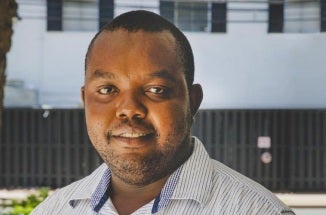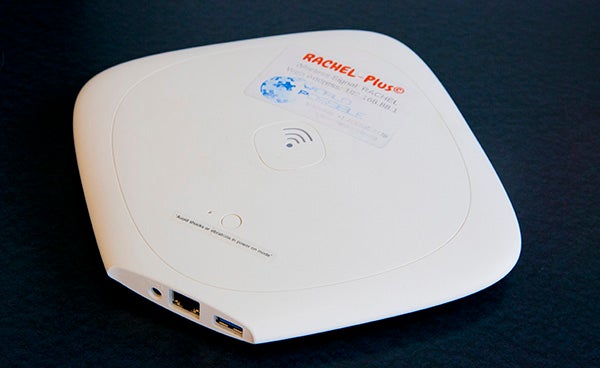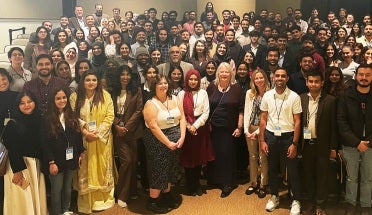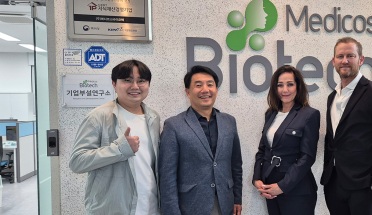
Accessing Knowledge in Remote Areas of Namibia
- Jul 28, 2017
- Global Customized Programs
A traditional African proverb states that "it takes a village to raise a child." But what happens when you add a little bit of technology? Esra Kavetu's combines both through the educational initiative that he has developed in rural areas of Namibia. Esra Kavetu was chosen by the US State Department to be a Mandela Washington Fellow, here at The University of Texas at Austin.
The Mandela Washington Fellowship is a part of the Young African Leaders Initiative (YALI) which aims to empower African civic, business and community leaders. These fellows have experience in promoting innovation and positive impact in their organizations, communities, and countries. For six weeks, fellows take part in academic coursework, leadership training, and networking at US universities. After the Fellows return home they will continue to build their skills by receiving training and support from various US development agencies.
Esra founded and serves as the director of World Possible Namibia. One major way that World Possible Namibia has been able to help people is by using the RACHEL (Remote Area Community Hotspot for Education and Learning) program. Namibia is the second least densely populated country in the world and development and infrastructure projects can be difficult and expensive. RACHEL allows individuals and communities to access educational content without the use of the internet.
Can you tell us about World Possible Namibia?
World Possible Namibia is a tech NGO that develops educational resources for rural areas. We download resources from websites and organizations such as Wikipedia, Khan Academy, and many other educational sites. We then package the resources unto our servers and deploy them in various communities such as schools, libraries, youth centers, and anywhere where they need education.
Why did you start World Possible Namibia?
It was my idea to start World Possible Namibia because I wanted to transition from commerce into the sciences and go to medical school. I found out that there are not many teachers and books for students who have completed high school and who want to continue their education. If I am struggling to find teachers to help me then I am not the only one.
One reason why there are so few teachers in these areas is because many of them move from local villages to bigger cities. For students left in these smaller communities it is harder for them to receive help. Education is also harder to receive because many telecommunication companies do not have internet service in these remote areas. I saw these issues and with help I launched World Possible Namibia with a plan to take information into these underserved areas.
How has the RACHEL Program been able to reach so many students and people?
RACHEL is an offline internet but everything on it is indexed and it is for educational purposes. The program allows us to customize the information for the needs of the people.
People can also add their own content onto it and modify it for their own educational needs. We are finding people who can upload local content and eventually I want to upload all Namibian textbooks, from primary school to university.
RACHEL allows us to copy information over and over again so that educational content can be on computers, cell phones, and tablets. RACHEL’s educational content has the potential to spread like wildfire.

How has World Possible Namibia changed and grown since you began your work?
At first, I was alone and struggled to register my company, but I got support from an engineer in California and friends in Namibia. Last year, I received assistance from B2Gold Corp because they are interested in corporate social responsibility. The mining company has donated resources such as tablets and funds. World Possible Namibia started as a one-person idea but it has grown into a big organization. Eventually, we want to go to all schools, homes, and correctional facilities so that all people have access to education.
What have you learned from UT and YALI Program?
It has been so exciting. I have learned how to make my business more professional. In the beginning, I focused my company being a donation based system but when I go back I will make it self-sustainable. The company will do side projects so we can generate more funds for the business.
I want to replicate the support that Austin has for companies and entrepreneurs. My goal is to build a community of professionals that help each other and give knowledge for those who want it. A hotspot for entrepreneurs.
What Austin or American Leaders have you met with and what have you learned from them?
On July 12th I met Jim, who is my professor's neighbor. We connected because he is a doctor and I want to go to medical school. He invited me to have dinner with his family.
My peer collaborator, Runu Michael Ukwade who works at Facebook is helping me how to pitch new ideas and to modernize my business. I have met with many people, made connections, and now my email is always flooded with messages from these contacts.
"The fellows are the vehicles that are helping Africa move to a more sustainable future."
What are your goals after you complete the fellowship?
In October, I will take my exams and if I pass I will go to medical school and be a full-time student.
One of my goals is to start an organization to help young professionals like myself. I want to encourage these young people with bright ideas to come together and help each other with their businesses. The organization will teach these people how to pitch ideas and manage their organizations.
After taking classes at McCombs, I want to become a part-time business consultant. I do not want to be in an office doing a 9-5 job; instead I want to work with kids and people.
What has been your favorite experience here in Austin and UT?
I enjoyed the Alamo Drafthouse and Capital Factory because it was a great experience to learn a lot about what they are doing.
I like Austin’s culture, the diversity, the different foods, and the clean city; it is wonderful.The people of Austin are awesome. I am planning to come back one day and maybe bring my family.
Why is it important for programs like the fellowship to exist?
It is important because the fellowship gives us the skills, knowledge, and opportunities to meet people who are professionals both inside and outside of our fields. The fellows are the vehicles that are helping Africa move to a more sustainable future.
I want to thank UT for having us here and I hope that more fellows can follow us.
Since 2014, The University of Texas at Austin has hosted the prestigious Mandela Washington Fellowship for Young African Leaders (MWF-YAL), the flagship program of the Young African Leaders Initiative (YALI). Learn more about the program and Fellows.
Interview by William Frankel
*This interview has been edited for length and clarity



